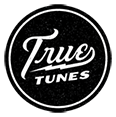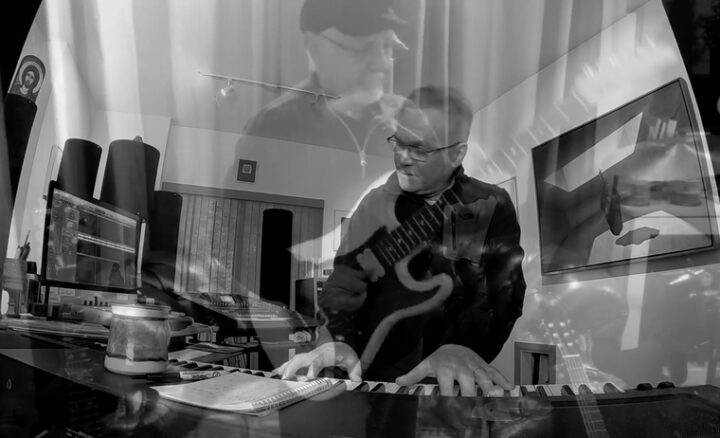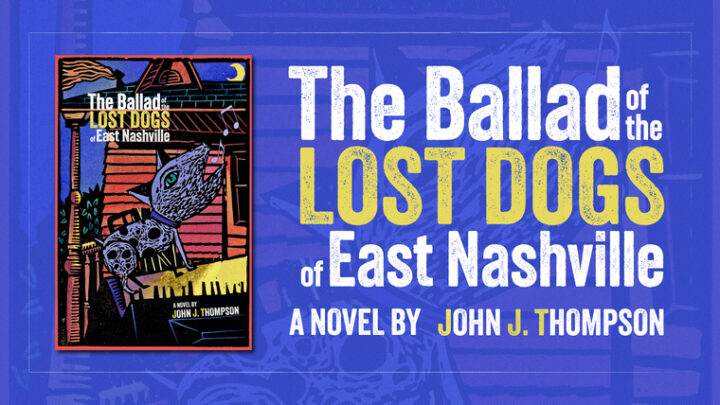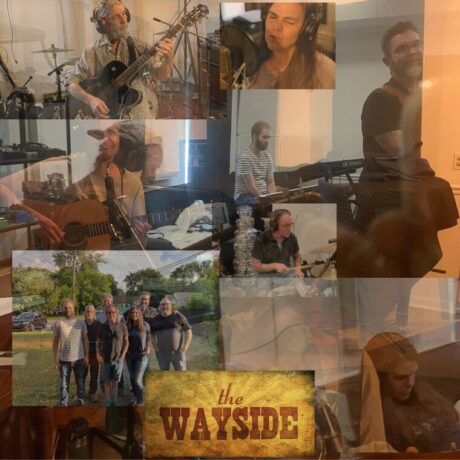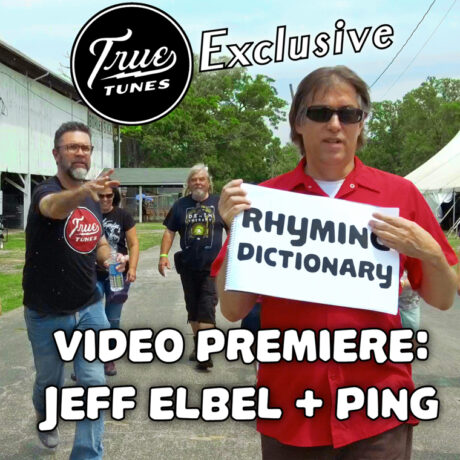Catching Up With Jeff Johnson
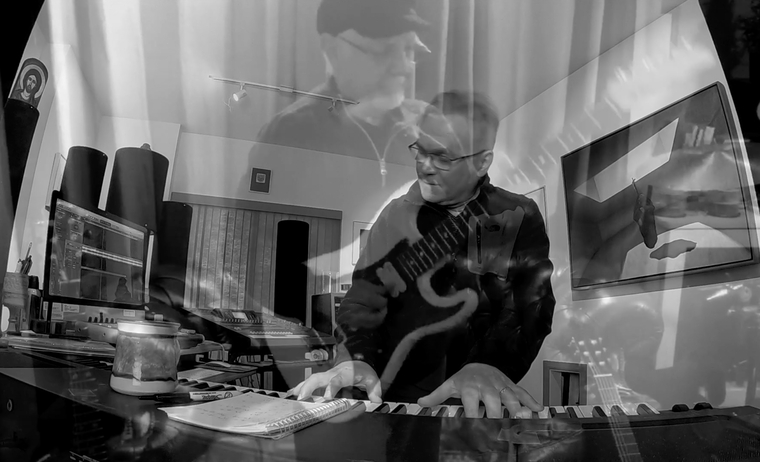
Jeff Johnson has been carefully crafting a wide range of contemplative instrumental and vocal music on his own terms since the mid-1970s. While his main instrument is the piano, Johnson was an early adopter of both synthesizers and samplers, bringing a sort of Brian Eno-meets-George Winston vibe to his work. He also embraced independent recording long before the digital revolution, loading a small truck with tape machines and traveling around looking for sounds to record and add to his music when such work was cumbersome and novel. Though he has partnered with various labels for distribution, Johnson was also a pioneer in the Indie Music world, launching his own Ark Music label more than 45 years ago.
True Tunes caught up with Johnson for this Q&A on the occasion of the release of his latest compilation with guitarist Phil Keaggy. Ravenna, which follows 2019’s Cappadocia, 2012’s Watersky, and 2009’s Frio Suite. Johnson has released 5 albums in the last 3 years, and if you’ve been listening to the True Tunes Gallery Stage Mixtape you’ve heard numerous selections from his catalog. We have also used several songs on the Podcast. So now, we find Johnson in his home studio in Washington state, taking a short break from whatever will be his next stunning project.
TT: How is Ravenna unique in your considerable catalog? What sets it apart for you?
Johnson: That’s an interesting question because when I meet someone new to my music I’m never really sure where to suggest they start since there are SO many releases that represent a pretty diverse musical palette.
But in the context of my work with Phil Keaggy, this one seems unique from the other three studio albums. We hadn’t planned to make another record so soon after the release of Cappadocia, but when he told me in May of last year that pretty much all of his touring had been canceled due to COVID, I asked if he wanted to begin working on some new music together. This was possible since Phil and I collaborate by sending tracks back and forth from Camano Island, Washington to Nashville, Tennessee using Dropbox.
That decision also had at least two major effects on me. First, the work literally kept me from going crazy between the months of May and November of 2020! And secondly, Phil had so much time on his hands, that he really took over the music! That was really fun for me to be involved with. I would say that our first two recordings (Frio Suite and WaterSky) were strongly driven by my musical direction; the WaterSky album, in particular, is very piano-based. Cappadocia was really a 50/50 effort. The fact that Ravenna is so guitar-driven really sets it apart for me. I love it and I believe all those Keaggy guitar geeks out there will, too!
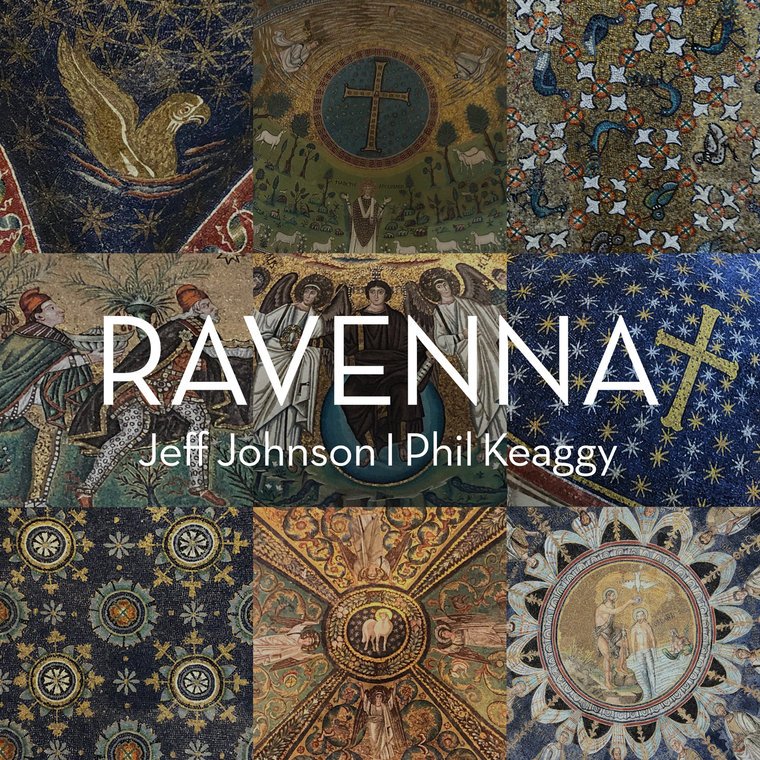
Where did the original inspiration come from and how did you set about trying to execute that inspiration?
I visited Ravenna, Italy in 2019 after leading a pilgrimage group that followed the footsteps of Francis of Assisi. It was a place I always have wanted to go to but it’s enough off of the beaten track that you have to make an effort. For those who are interested, Google “Ravenna, Italy” and look at the images and you’ll understand why I would have wanted to visit!
Phil and I have always collaborated with a sense of place in mind (Frio River, Cappadocia) and when we decided to make this new one, I suggested that we put ourselves under the beautiful mosaics of Ravenna. Of course, that made Phil pull out his mandolin and borrow a mandocello!
But the inspiration of these mosaics runs deeper in the music. Each of our compositions tend to be longer pieces and made up of a number of musical themes, textures, and dynamics. They really are musical “mosaics” and instead of coming up with titles for each one and limiting the idea to that title, we decided to simply call each of the eight songs, “Mosaic 1” through “Mosaic 8.”
There’s also this sense that our lives – and we are a couple of OLD guys now – have been made up of many, many “pieces” that make up who we are. This idea is so beautifully expressed in the poem that poet Scott Cairns wrote for the album which ends with the lines: “as each sharp edge avails for us a place to meet as necessary—members, yes, partakers of the all.”
Collaborations have been a major part of your work over the last 40 years. Why is that, and how has all of this work with other artists (Brian Dunning, Wendy Goodwin, John Fitzpatrick, etc.) impacted you as an artist?
Music is very much a communal experience and it certainly has been for me. Many of the earlier Ark releases feature the collaboration I had with guitarist/singer, Sandy Simpson. Then there were the albums I made with jazz bassist, David Friesen which, interestingly enough, were what exposed Phil to my music in the 1980s. Meeting Irish flutist, Brian Dunning and initially making music inspired by the novels of Stephen Lawhead were also significant. And my work with classical singer, Janet Chvatal and the two incredible violinists you mentioned, John Fitzpatrick and Wendy Goodwin along with Slovakian cellist, Jozef Lupták have all been incredibly fruitful.
Perhaps it’s because I’ve always recorded and produced my own music in my own studio so maybe I’m just lonely! Yet, when you get the chance like I have had to work with such amazing musicians, you’re wise to make as much room for them as possible to participate.
At the end of the day, I have to make the final decisions on how things are going to come together. But until I get there, I’ve learned and greatly benefited from having had an attitude of trusting the people that I work with. The music is better for it and all of these people have become dear friends.
You were one of the early artists making contemporary music from a Christian perspective back in the 1970s, though your music always felt like it belonged more in the same space as someone like Bruce Cockburn or Peter Gabriel than, say, Steve Green or Michael W. Smith. How did you perceive the integration of your faith and your art early on, and has that evolved over the decades? Was that balance impacted by your early experiences with the Christian music industry and your eventual decision to move into your own space?
I began writing music at a fairly young age. It was and always has been a crucial way for me to think and work out the various seasons of my life. Thus, music has always been about expressing the things that were important to me at the time. There has never really been an effort on my part to make music that others might like. It’s really been a process of making recordings that I would like to listen to. I hope that doesn’t sound too narcissistic!
But seriously, my faith has always played an important role in my music-making. So in my late teens and as I moved through my 20s and 30s the music really reflected the early stages of that Christian faith along with the many books that I was reading, the art that I was viewing, and of course, the music that I was listening to.
I began recording on my Ark Records label in 1977 and by the mid-1980s, my music was being distributed by Sparrow Records. I would describe that season of my music as “reflecting a Christian worldview” rather than being “Christian music.” It was in the mid-1980s that I also started releasing all-instrumental recordings since that was also the time of the emergence of labels like Windham Hill who popularized that ill-defined musical genre, “New Age Music!”
There came a point in the early 1990s that it didn’t make sense for me to stay with Sparrow. That was a pretty big deal for me since I had such a great relationship with both Billy Ray Hearn (Sparrow’s founder) and his son, Bill Hearn, who was leading the company then. I look back on those years and realize how fortunate I was to have worked with such great people.
Once Brian Dunning and I began making more of our “contemporary Celtic” instrumental recordings, it was pretty natural for us to have our music distributed by Windham Hill and Hearts of Space. Stephen Hill at Hearts of Space remains one of the smartest people I’ve ever met in the business and I learned a lot from him.
Yet in early 2000 after we had moved up to Camano Island, Washington from Portland, Oregon, I got involved with collaborating on leading contemplative worship in a local church in a service that we called “Selah Service.” That was sort of a return to expressing my faith more overtly in my music again. And that’s really been the basis for a lot of what I’ve done vocally in the past twenty years all while continuing to create instrumental recordings with Brian, Phil, and others.
Do you find mainstream audiences receptive to your exploration of spiritual, and even theological themes?
I think so. I’d like to think that every human being is interested in beauty, love, and a need to find and live with a greater-than-ourselves sense of existence. I know that my music has moved people and offered them a sense of wonder regardless of their theological underpinnings. That’s really all I can hope for even with the music that I create for more liturgical settings.
You work in a genre that is often associated with Eastern spirituality and openness. Does that openness include your expressions of traditional Christian ideas?
That’s a very interesting question and I’ve had to think carefully before answering it over the many years of my career. In the mid-80s, when I began making all-instrumental recordings, I had the good fortune to be involved with Sparrow Record’s Meadowlark label. All of the Christian labels at the time were beginning to put out contemporary instrumental records to “catch the wave” of success mainstream labels like Windam Hill were experiencing. Yet, Meadowlark was a really legitimate effort by Sparrow that not only launched my career in this genre but also the career of my good friend Richard Souther.
But Sparrow hadn’t really thought about the ramifications of putting music that was being called “New Age” into Christian bookstores. So, I was given the job of responding to some of the accounts that were ready to send them ‘to hell in a handbasket!’ I tried to remind those folks that there is a very rich tradition in the Christian church of ‘music without words’ (Bach comes to mind.) And of course, many of the Psalms are written from a “contemplative” posture. Ironically, contemplation and meditation, while associated with Eastern spirituality by some, have a deep rootedness in all ancient Christian traditions and are very much at the heart of prayer.
When I started releasing my instrumental music through Windham Hill and Hearts of Space, the fact that it reflected my Christian faith was largely a non-issue. There were people who didn’t like the idea of having recordings reflecting a Christian worldview in their New Age book shop, but I found some of those interactions and conversations, as I had with some of those Christian bookstore managers, very positive. They often lead to deeper things.
In addition to Ravenna – it looks like you snuck out a couple of other albums just last year! Tell us about Lauds and Kohelet and this spate of productivity you are experiencing.
Thanks for asking about those two. I like them very much! In past times, those two releases probably would have been put together in one album. But I have several different audiences that listen to me – those who are drawn to my instrumental recordings and those who appreciate my more contemplative worship ones.
Both were recorded at the same time the previous year before they were released. I always seem to be working on new music. It’s funny, at my age you’re always asking yourself, “Is this my last recording?” And then some new ideas come along and you’re off on another project!
Lauds features some of the best “contemplative worship” songs I think I’ve ever written. And Kohelet (which is another name for the writer of Ecclesiastes) is a really beautiful “chamber” recording with Brian Dunning and Wendy Goodwin which is really an extension of the album we made together just prior entitled If I Do Not Remember …
Our theme has become “Listening to better music, and listening to music better” – because we are finding that learning to listen better can make us better people. I remember my first exposure to your music was some of your work that used sounds from either nature or things like swing sets or other sounds from the environment, that you would record and then build music around. I must have been about 14 when I first heard that and it really enchanted me. Where I would have heard just a rusty gate – you heard the potential for music. You were listening well – but hearing more. Do you have any counsel for us about how to cultivate our capacity to listen for the music around us?
Listening today is deeply underrated and under-appreciated as is silence. And the listening that most people do is largely private and not communal which is also a poverty of experience.
Modern society is incredibly distracting – helped by the constant demands for our attention from our personal technology. One has to really work at stopping oneself and paying attention to a piece of music, the reading of a poem, or the consideration of a painting or photograph. It’s a discipline really and as you say in your question, you have to cultivate it.
I think many people might benefit from listening to music with other people – not just putting it on while you have dinner together, etc. but really sitting down and listening together. That’s what’s great (and what we’re all missing terribly just now) about going to a concert or even a beautiful service of worship.
You asked me about my musical collaborations, but importantly, the appreciation and understanding of art completely depends on a “collaboration” between the artist/musician and listener. Ideally, there’s this unspoken “good faith” promise made between the artist, who does their best to create a work, and the listener, who does their best to listen and understand it. If you think this way about the process of listening, you’ll become a better listener.
What is the best way for fans to keep in touch with you and stay up to date on what you are up to?
My ArkMusic website is: https://www.arkmusic.com. I’m also doing a lot of things on my YouTube channel: https://www.youtube.com/user/ArkMusicMovies. And there’s my artist Facebook page https://www.facebook.com/jeffjohnsonarkmusic
as well as writing info@arkmusic.com and asking to be put on my mailing list.
